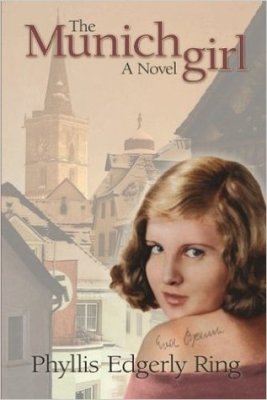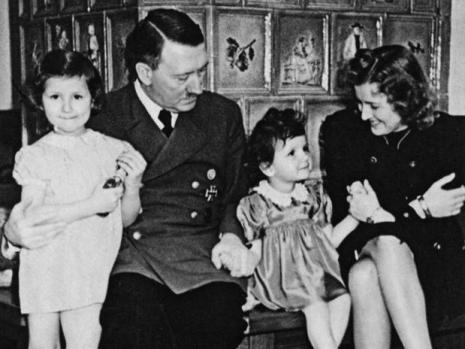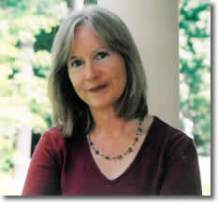The Munich Girl: A Novel by Phyllis Edgerly Ring

Paperback, 1st Edition, 356 pages
Published November 14th, 2015 by Whole Sky Books
Growing up in the Netherlands, where every first week of May is basically dedicated to WWII, and with parents who were both born during the war (my mother even before Germany invaded Holland), I thought I was pretty well-informed on the topic. I studied History for two years in which, again, a lot of WWII was covered. Then I started reading this book and realized I still only know so little.
~Goodreads Synopsis~
“Anna Dahlberg grew up eating dinner under her father’s war-trophy portrait of Eva Braun. Fifty years after the war, she discovers what he never did—that her mother and Hitler’s mistress were friends. The secret surfaces with a mysterious monogrammed handkerchief, and a man, Hannes Ritter, whose Third Reich family history is entwined with Anna’s. Plunged into the world of the “ordinary” Munich girl who was her mother’s confidante—and a tyrant’s lover—Anna finds her every belief about right and wrong challenged. With Hannes’s help, she retraces the path of two women who met as teenagers, shared a friendship that spanned the years that Eva Braun was Hitler’s mistress, yet never knew that the men they loved had opposing ambitions.
Eva’s story reveals that she never joined the Nazi party, had Jewish friends, and was credited at the Nuremberg Trials with saving 35,000 Allied lives. As Anna’s journey leads back through the treacherous years in wartime Germany, it uncovers long-buried secrets and unknown reaches of her heart to reveal the enduring power of love in the legacies that always outlast war.”
I think I already knew who Eva Braun was when I was around 8 years old, but I never actually knew the face and the story behind the wife of Hitler. I always imagined she was a stern looking lady, with dark brown hair (maybe due to her last name as well) and a riding crop in her hand. Someone to match Hitler perfectly. Now look at the cover of this book. That’s actually Eva Braun.
The Munich Girl tells us the story of three women: Anna (the main character), Peggy (Anna’s mother), and Eva Braun.
Anna’s story takes place in 1995, exactly fifty years after the war has ended. Her mother has recently died and she and her husband Lowell are now living in her mother’s old house. Lowell is a first class douchebag and Anna just meekly lets him order her around. When Lowell’s life work, a giant volume on the life and times of Hitler, is about to be published, he forces Anna into editing an accompanying article for it in a magazine he owns. When Anna meets Hannes, a German guy, who’s roughly the same age as her (Anna is fifty years old) and appointed by her husband as the new head of writing and editing for the magazine, she feels pulled towards him right away. Anna’s mother was also from Germany which is one of the reasons why they instantly connect.
Hannes gives Anna the assignment to write an article about Eva Braun, Hitler’s mistress/wife. When Anna starts digging into the subject, she discovers Eva was actually friends with her mother.
The story is told from three different perspectives: Anna’s life in 1995, and Peggy and Eva’s life pre- and post-wartime. There aren’t only fifty plus year old flashbacks, but also flashbacks within 1995 itself: before and after a plane accident (this is no spoiler because the book starts with Anna looking back at the accident) Anna is involved in.
This book describes a journey towards finding out who Eva Braun was as a person and how that reflected on the lives of Anna and her mother.
The author did an amazing job at mixing historical fiction with historical facts. I sometimes forgot I was reading a novel instead of a biography. Even though relatively little is known about Eva and her relationship with Hitler, extensive research and filling in the gaps with fiction make Eva come alive as if she has only died recently, instead of almost 71 years ago.
I felt incredibly compelled to find out more about her while reading this book. She seems like such a warm person, with a sincere childlike playfulness to her. Which makes you wonder what on earth she was doing with Hitler? It wasn’t as if she was unaware of the hideous atrocities he was committing at the time. She knew. Yet it’s almost like she didn’t care about any of it. As if all she ever wanted was to marry Hitler, live a normal life with him and have his babies. He was her sun and stars.
Their entire relationship reminds me a bit of the ‘loverboy’ phenomenon, in which young men recruit vulnerable young girls by seducing them and then pimping them out to their friends, and later on, strangers. I’m not comparing Hitler to a loverboy, but I’m comparing Eva Braun to those girls who are so madly in love with their ‘captors’ that they are willing to do anything for them, even though they know it’s wrong. Until there is no way back.
Now this isn’t an entirely fair comparison because technically, Eva was free to go at any time. She didn’t even have to become a member of the Nazi party, apparently, because she never was one. ‘Adi’ was all that mattered to her and she was completely neutral when it came to his politics. In fact, it seems like she only hoped to win the war (or have it over with, at least) so they could finally settle down together and lead a normal life. Naive? Yes, but not a very uncommon behaviour because there are lots of women out there who make similar sacrifices to be with their men.

This is probably all she ever wanted.
I think Eva Braun just needed a really good therapist. And maybe some ECT along the way. I mean, it’s pretty clear that she was suffering from some mental issues in the first place after trying to commit suicide twice because her boyfriend took her for granted. We can, again, still see that behaviour in people nowadays as well. It’s safe to say that Eva suffered from fear of abandonment. As Anna, later on in the story, says about her life with Lowell:
“It’s as if I have always felt, somehow, that I had to do the right thing, so he wouldn’t stop loving me. Wouldn’t leave.”
I think this is what applied to Eva as well (and is actually a pretty big similarity when it comes to the relationships between Anna and Lowell, and Eva and Hitler).
“Adi had given her a life she would otherwise never had known. She would not betray this generosity, or relinquish the honor of being one of the few who had this trust.”
Something I can’t understand from a trivial point of view, though, is that Hitler appeared to be chronically flatulent, had very bad teeth and smelled like a cesspool not only from his balloon knot but also from his mouth. How can you be so smitten with someone who doesn’t only have a horrible personality, but is also giving me gag reflexes just by thinking about having to make out with him? YUCK!
Back to the book. Even though this book was mind-blowing and had me browsing the internet for hours on end when it comes to Eva and Hitler, I didn’t end up with giving it 5 brownies, but 4 instead, due to a few reasons.
One is that there’s a lot of German in the book. Now I can understand German just fine, so that wasn’t an issue for me, but it was just too much. I can only imagine people who don’t understand the language will get a bit frustrated with it. Luckily for them, though, the author does translate all of it into English as well right away, but still. I would’ve appreciated a little less German.
Then there’s Anna’s ignorance when it comes to finding things out about Eva Braun and her mother. I mean, if I can see things coming from a mile away, then what kind of reporter/researcher are you to be so blind to the information that is given to you? Maybe it has something to do with subjectivity.
The biggest problem I had (I don’t know if you can really call it a problem, though, because I really liked this book) is the avalanche of revelations in the end. I can appreciate it when storylines are nicely tied up instead of having to guess half of their outcomes, yet it was about 10% (I honestly don’t know how many pages that is) of revelation after revelation, coming to a point where I got a little confused about what was going on exactly.
That being said, the rest of the book is great, the author has a very pleasant writing style and a way of describing things which made me want to go back to Germany pronto. Apart from that, she gave Eva a voice, and a darn good one. I could feel the pain behind it and actually felt sorry for her tragic ending, in which she committed suicide together with Hitler in his underground bunker, just one day after he finally agreed to marry her.
Which brings me to the question you can ask yourself throughout the entire book: does Eva Braun deserve our sympathy?
I’m going to answer it by quoting a line from the book.
“One could look at another’s life and judge or envy what it seemed to show. But things were almost always more complex than they appeared.”
In my hours of reading and looking at all things Eva Braun, I encountered her home videos on Youtube. I think they are extremely fascinating to look at and they really correspond well with The Munich Girl because of certain scenes in it which describe Eva’s life at Hitler’s villa near Berchtesgaden. It’s very interesting to actually see the terrace which Anna dreams and speaks about so often.
I’m recommending this book to everyone with even the slightest interest in history.
A big thank you to Phyllis Edgerly Ring for providing me with a copy of her book in exchange for an honest review.




~About the Author + Interview~
Phyllis Edgerly Ring lives in New Hampshire and 
returns as often as she can to her childhood home
in Germany. Her years there left her with the deep
desire to understand the experience of Germans
during the Second World War. She has studied plant
sciences and ecology, worked as a nurse, been a
magazine writer and editor, taught English to
kindergartners in China, and frequently serves as
workshop facilitator and coach for others’ writing
projects. She is the author of the novel Snow Fence Road, and the inspirational nonfiction, Life at First Sight: Finding the Divine in the Details. She is co-author, with Ron Tomanio and Diane Iverson, of With Thine Own Eyes: Why Imitate the Past When We Can Investigate Reality?, an exploration of how to achieve balance between the material and spiritual aspects of life.
Because this book and its main topic are so interesting, I decided to ask Phyllis if she wanted to answer a couple of questions about it. She did, so here’s a little interview with her!
The Munich Girl deals with such a fascinating, perhaps even controversial, topic. Where did your inspiration for it come from?
My parents had an American/British wartime marriage. My career-military father was stationed in Germany twice, and I lived there during my family’s second tour of duty in the 1960s. German families were among my very first friends and Germany made a deep impression on my heart. Then I married someone who had also spent part of his childhood in Germany. Eventually, we returned there together and I realized that I wanted to understand more about the experience of Germans during the war. Within a week, a series of developments began unfolding for me, and two, in particular, were significant. I received a copy of British writer Angela Lambert’s biography of Eva Braun, and a combination of circumstances led to my owning the portrait of Eva that features in the story.
(…Gasps…)
You never know where a decision will lead—I certainly never imagined that the pathway of my discoveries about Germany would follow the life of Hitler’s companion.
It was a major turning point for me when I discovered, as I researched the Trials at Nuremberg, that an action of Eva Braun’s in the last week of her life had saved the lives of about 35,000 Allied prisoners of war. Two members of my mother’s family were among them. This led me to new levels in the unfolding of the book’s story, spurred by the idea that the reality of situations is always deeper and more complex than things may appear on the surface. And also, the power of real relationships, no matter the circumstances around them, can have beneficial effects even generations later.
All images in the novel are from Eva Braun’s photo albums at the National Archives, or from her films. A kind photographer named Ed Fusco, who has insightful knowledge of WWII history, has been a great companion in the course of my research.
Have you always felt drawn to World War II history?
Not in the slightest, until my mother died, and then even more strongly
once my father did. In fact, within weeks, I was already on the path to this book. No doubt my own family’s connection with the War deepened my own connection with it.
There’s quite a lot of German in the book. Are you a fluent speaker of the language yourself?
No, definitely nowhere near fluent — speaking is the hardest. Of course. But I’m understanding more every year. And my book designer and her mother are German.
It’s never specifically mentioned in the story, but can we consider Anna to be the reincarnation of Eva Braun?
It occurred to me along the way that this is a conclusion some readers might draw. It isn’t my intended one – I happen to feel that all souls are potentially connected and related at all times, throughout all time, and that our deepest connection with each other exists outside of time and place. What comes closer to my own intent here is the concept that, as souls, we can always assist each other’s development, no matter in what worlds two souls each happen to be living. In the case of Anna and Eva, the story’s energy, for me, has always felt to be that each of them benefits from Anna’s delving deeper to find truth, both what she uncovers in her own psyche, and what she can recognize in the stories of Eva and Peggy.
Why did you choose to let the present part of the story take place in 1995?
This benchmark, 50 years after the end of the war, represents a turning point for humanity, I think. How willing were we, are we, to go back and look more deeply at what had been left behind, unrecognized and unresolved, in that
immense, human-initiated catastrophe? But also, the year 1995 is already “historical” in fiction’s terms, because it is about from that point that the technology of the virtual world began to assert itself in human life, rendering a very different human experience in our world today. To the extent that this material advancement isn’t matched by the development of inner-life values and compassionate, united perspective, I think we wreak havoc and suffering still.
Are you going to write another book and, if so, what can we expect of it?
Inevitably, my next book is likely to be a memoir-style reflection about where this novel has led me. It is certainly not what I would ever have predicted or expected, and there are experiences that I’m probably never going to be able to understand, let alone explain. Many of them relate to the lives of the two other individuals in the story who actually lived (and died) in wartime Germany and made very courageous contributions: writer and artist Erich Mühsam and a Jesuit priest, Father Alfred Delp, who aided the Resistance.
As my final question, I’m going to ask you the same I asked the readers at the end of my review: according to you, does Eva Braun deserve our sympathy?
Reading is such a personal experience, and this decision is certainly a personal one for the reader. It isn’t actually the story’s goal to try either to elicit this or to “redeem” Eva Braun and how she is perceived. She’s an excellent motif for examining how people, especially women, suppress our own lives, and what the forces are that can lead us to do that. She also offers a way to look at the reality that human beings are complex. She clearly had a conscience, and acted on it, and, like most of us, tried to make good choices — choices to serve good — when she could. Then, she also made ones that served neither herself or others well. Do we negate or devalue the contributions that someone makes because they also make choices that are misguided, ill-advised, or even personally destructive? Do we not all share this same complexity in experience? These are themes I wanted to consider as this story unfolded.
Phyllis is available for a variety of presentations based on this novel, Eva Braun, and the era of World War II Germany. She also loves to hear from readers.
You can e-mail her at: info@phyllisring.com
Find her blog here
Connect on Facebook
On Twitter
At Goodreads
Links to the book:

I love author interviews, they are such a great and insightful further look into the books. Well written review, as always! 🙂
LikeLiked by 1 person
They definitely are! Especially when it’s about an intriguing subject :). Thanksees!!
LikeLike
Very interesting indeed. A lot of attention is being given to Hitler (the younger Hitler) in Germany at present in a new television programme.
LikeLiked by 1 person
I saw that idd! Something about WWI and how he came to be the Führer I believe. Too bad I cancelled my TV subscription recently 🙂
LikeLike